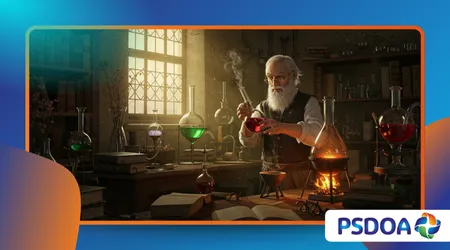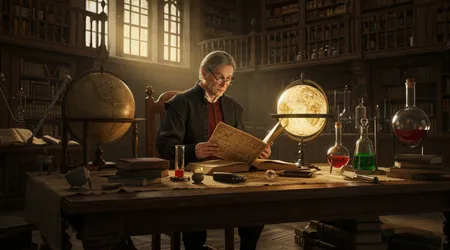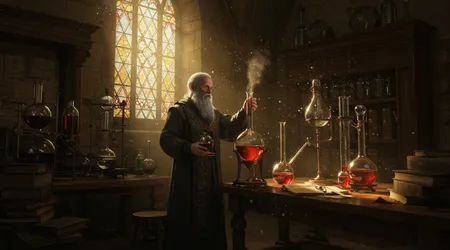The Secret History of Alchemy and Early Chemistry

The secret history of alchemy and early chemistry weaves a tale of human curiosity, blending mysticism with the roots of modern science.
Anúncios
Far from being a mere footnote in history, alchemy laid the groundwork for chemistry, shaping our understanding of the natural world.
This journey through time reveals how alchemists, often misunderstood as charlatans, were pioneers whose experiments and philosophies sparked a scientific revolution.
Why do we dismiss their legacy as mere folklore when their work birthed a discipline that powers our modern world?
In this exploration, we’ll uncover the hidden truths of alchemy, its impact on early chemistry, and its surprising relevance in 2025, drawing from real historical insights and current scholarship to paint a vivid picture of a forgotten era.
Anúncios
Alchemy’s allure lies in its dual nature: part science, part philosophy, and wholly human. It wasn’t just about turning lead into gold; it was a quest to understand the universe’s essence.
From ancient Egypt to Renaissance Europe, alchemists like Zosimos and Jabir Ibn Hayyan pushed boundaries, their work echoing in today’s laboratories.
This article will delve into their methods, their influence on modern chemistry, and how their legacy persists in unexpected ways.
By examining authentic historical records and recent studies, we’ll reveal the secret history of alchemy and early chemistry as a cornerstone of scientific progress, inviting you to rethink its place in our collective narrative.
The Roots of Alchemy: A Blend of Mysticism and Experimentation
Alchemy’s origins trace back to Hellenistic Egypt, around the 3rd century AD. Zosimos of Panopolis, an early alchemist, mixed practical metallurgy with spiritual musings.
His texts described distillation, a technique still used in labs today. The secret history of alchemy and early chemistry begins here, with alchemists as proto-scientists exploring matter’s mysteries.
Their work wasn’t just about gold; it sought to perfect nature itself, blending observation with cosmic ambition.
This fusion of the practical and the mystical defined early alchemy. Alchemists like Jabir Ibn Hayyan, an 8th-century Persian scholar, cataloged substances meticulously, laying groundwork for chemical classification.
His distillation methods purified liquids, a precursor to modern chemistry’s precision.
++ The Real Reason the Roman Empire Fell
Yet, their secretive language filled with symbols like the “green lion” veiled their discoveries, fueling myths of sorcery. This secrecy, born of competition and fear, obscured their contributions for centuries.
Recent scholarship, like Lawrence Principe’s The Secrets of Alchemy (2012), highlights alchemy’s empirical rigor. Principe recreated alchemical recipes, proving their chemical validity.
This challenges the view of alchemy as mere fantasy, showing it as a disciplined pursuit.
The secret history of alchemy and early chemistry reveals a science in its infancy, driven by curiosity and experimentation, not just mysticism.

The Golden Age of Alchemy: Renaissance Innovations
By the Renaissance, alchemy flourished across Europe, blending science with art. Figures like Paracelsus revolutionized medicine, using alchemical principles to create remedies.
His work with minerals introduced new treatments, a testament to the secret history of alchemy and early chemistry. Alchemists weren’t just dreamers; they were practical innovators, shaping early pharmacology with tangible results.
The period saw alchemy’s influence on metallurgy and mining. Lazarus Ercker’s 1574 treatise detailed smelting techniques, still relevant in modern industry.
Also read: Lost Languages and the Race to Decode Them
Alchemical laboratories, like Tycho Brahe’s at Uraniborg, were hubs of experimentation. Archaeological digs in 1988–90 uncovered glass shards from Brahe’s lab, revealing sophisticated equipment.
The secret history of alchemy and early chemistry shows a discipline grounded in real-world applications, not just esoteric quests.
This era also saw alchemy’s philosophical depth. Michael Maier’s Atalanta Fugiens (1617) used allegories to encode chemical processes, blending art with science.
Such works weren’t mere riddles; they preserved knowledge in an age of persecution.
The secret history of alchemy and early chemistry underscores how these thinkers balanced empirical work with intellectual creativity, laying foundations for modern science.
Alchemy’s Transition to Chemistry: A Scientific Revolution
The 17th century marked a turning point. Robert Boyle, often called a father of modern chemistry, built on alchemical foundations.
His experiments with gases echoed alchemical techniques, as noted in Principe’s 1989 analysis of Boyle’s papers.
The secret history of alchemy and early chemistry reveals Boyle’s reliance on alchemical transmutation, challenging his image as a purely rational scientist.
By the 18th century, alchemy and chemistry began to diverge. Antoine Lavoisier’s elemental theories replaced the four-element model, but even he drew from alchemical ideas, as William Newman suggests in Smithsonian Magazine (2014).
Read more: The Hidden Role of Africa in Ancient Global Trade
This shift wasn’t a rejection but a refinement. The secret history of alchemy and early chemistry shows a gradual evolution, not a sudden break, as alchemical practices informed modern methodologies.
Consider the example of the “philosophers’ tree,” an alchemical experiment recreated by Principe. Heating lead produced a yellow, floating substance a real chemical reaction, not magic.
Such experiments bridged alchemy to chemistry, proving their shared roots. The secret history of alchemy and early chemistry illustrates how these early efforts shaped the scientific method we rely on today.
Alchemy’s Modern Echoes: Relevance in 2025
In 2025, alchemy’s legacy resonates in unexpected ways. Analytical chemistry now uncovers alchemical secrets, as seen in a 2024 ResearchGate review analyzing artifacts from Tycho Brahe’s lab.
Non-destructive spectrometry reveals the sophistication of alchemical tools, affirming their scientific value. The secret history of alchemy and early chemistry lives on in these discoveries, connecting past to present.
Alchemy also inspires modern innovation. For instance, AI research draws parallels to alchemy’s trial-and-error spirit, as noted in a 2021 Quanta Magazine article.
Just as alchemists sought the philosopher’s stone, AI researchers explore latent spaces for breakthroughs. This analogy highlights alchemy’s enduring influence on creative problem-solving.
The secret history of alchemy and early chemistry reminds us that science thrives on bold experimentation.
Moreover, alchemy’s cultural impact persists. A 2025 exhibition at the Science History Institute showcases alchemical manuscripts alongside art, revealing their aesthetic and intellectual depth.
This ongoing fascination underscores alchemy’s role in shaping human curiosity. The secret history of alchemy and early chemistry continues to inspire, proving its relevance in our tech-driven world.
The Misunderstood Legacy: Reclaiming Alchemy’s Place

Alchemy’s reputation as pseudoscience stems from 18th-century critiques, yet modern historians challenge this. A 2017 Brill’s Encyclopaedia study shows alchemy’s role in early scientific networks, fostering cross-disciplinary dialogue.
Alchemists weren’t frauds; they were pioneers navigating uncharted territory. The secret history of alchemy and early chemistry demands we rethink their dismissal as mere mystics.
Take the example of John of Rupescissa, a 14th-century friar who developed medicinal elixirs. His work, rooted in alchemical principles, saved lives, prefiguring modern pharmacology.
Such contributions highlight alchemy’s practical impact. The secret history of alchemy and early chemistry reveals a discipline that balanced empirical rigor with philosophical inquiry, shaping science’s trajectory.
Today, organizations like the Society for the History of Alchemy and Chemistry (SHAC) promote this nuanced view.
Their 2025 seminar series explores alchemy’s material culture, from cupels to manuscripts. This scholarly revival underscores alchemy’s foundational role.
The secret history of alchemy and early chemistry is no longer hidden it’s a legacy we’re only beginning to appreciate.
Table: Key Alchemical Contributions to Modern Chemistry
| Alchemist | Contribution | Modern Impact |
|---|---|---|
| Zosimos of Panopolis | Developed distillation techniques | Basis for modern chemical purification |
| Jabir Ibn Hayyan | Classified substances systematically | Foundation for chemical nomenclature |
| Paracelsus | Introduced mineral-based medicines | Influenced pharmacology |
| Lazarus Ercker | Detailed smelting processes | Advanced metallurgy techniques |
Source: Adapted from Principe, L. M., The Secrets of Alchemy (2012)
Conclusion: Rewriting Alchemy’s Story
The secret history of alchemy and early chemistry is a testament to human ingenuity, blending curiosity with empirical rigor.
Far from a relic of superstition, alchemy was a crucible where science and philosophy merged, forging the path to modern chemistry.
Its influence lingers in 2025, from AI’s experimental ethos to cultural exhibitions celebrating a legacy no longer forgotten but celebrated.
This journey through alchemy’s past reveals a truth: progress often hides in plain sight, masked by misunderstanding. By embracing this history, we honor the alchemists’ bold vision.
Their story isn’t just history; it’s a call to explore the unknown with courage. The secret history of alchemy and early chemistry invites us to see science as a human endeavor, full of wonder and possibility.
As we move forward, let’s carry this lesson: the line between magic and science is thinner than we think.
Alchemy’s revival in modern scholarship proves that no knowledge is ever truly lost it waits to be rediscovered. Let’s keep searching, inspired by those who dared to transform the world.
Frequently Asked Questions
What was the main goal of alchemy?
Alchemy aimed to transform base metals into gold, create elixirs for immortality, and understand the universe’s fundamental laws through experimentation and philosophy.
How does alchemy relate to modern chemistry?
Alchemy’s techniques, like distillation and substance classification, directly influenced modern chemistry’s methods, with figures like Boyle building on alchemical foundations.
Why was alchemy considered pseudoscience?
18th-century critics dismissed alchemy’s mystical elements, ignoring its empirical contributions. Modern research, like Principe’s, reveals its scientific validity.
Are there modern applications of alchemical principles?
Yes, alchemy’s trial-and-error approach inspires fields like AI and material science, while its legacy in pharmacology and metallurgy remains vital.
How is alchemy studied today?
Historians and scientists, like those at SHAC, use analytical chemistry and manuscript analysis to uncover alchemy’s techniques and cultural significance.
